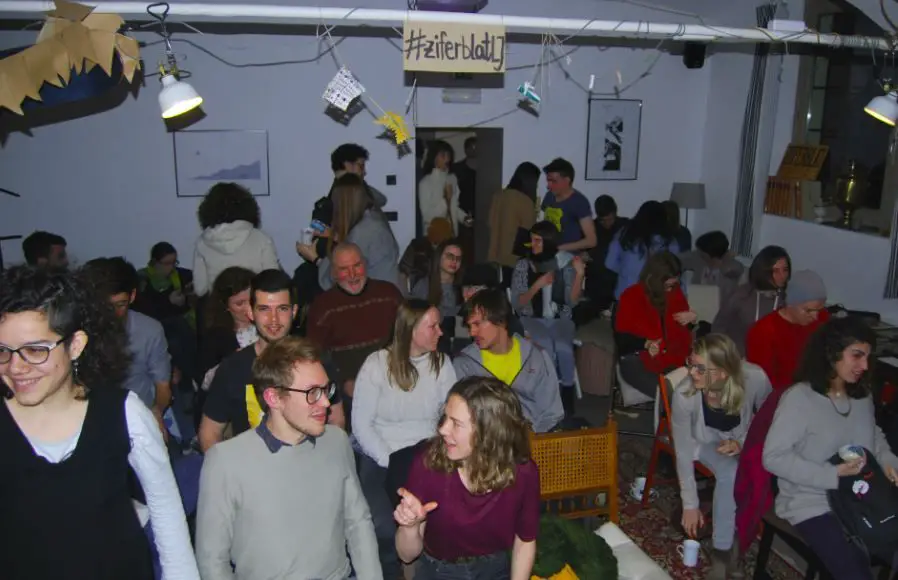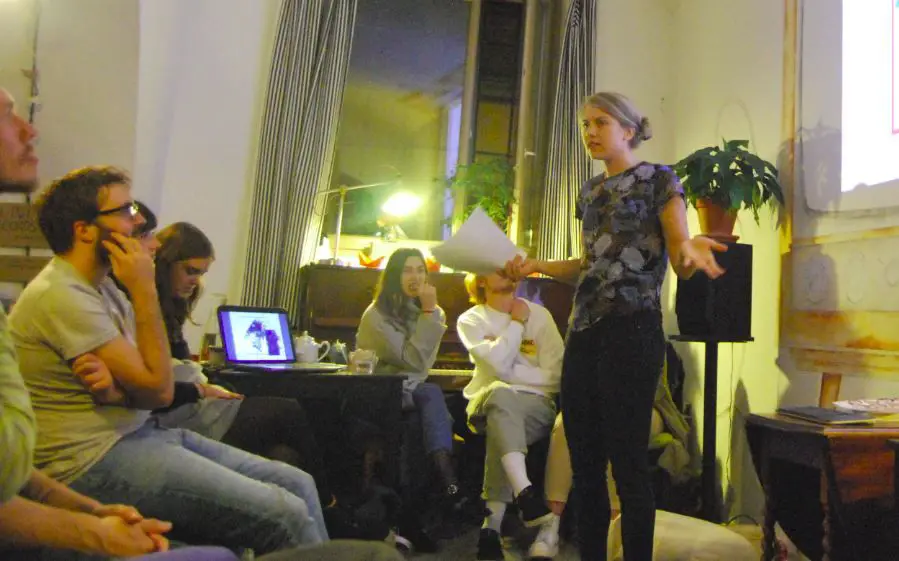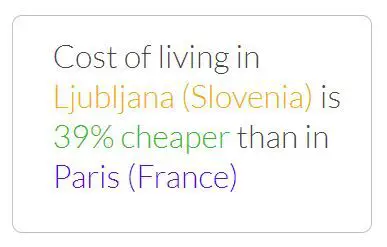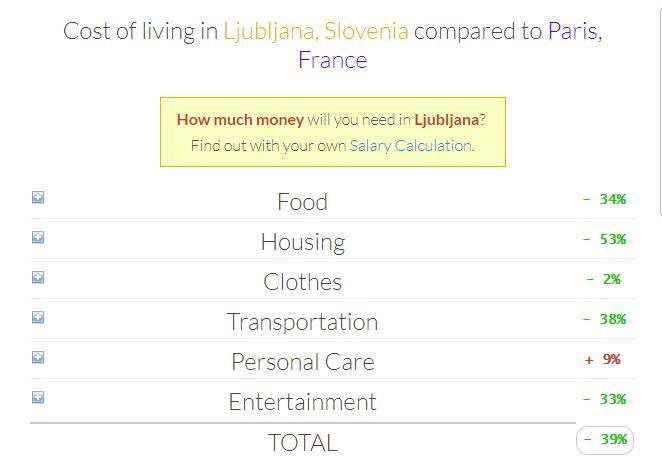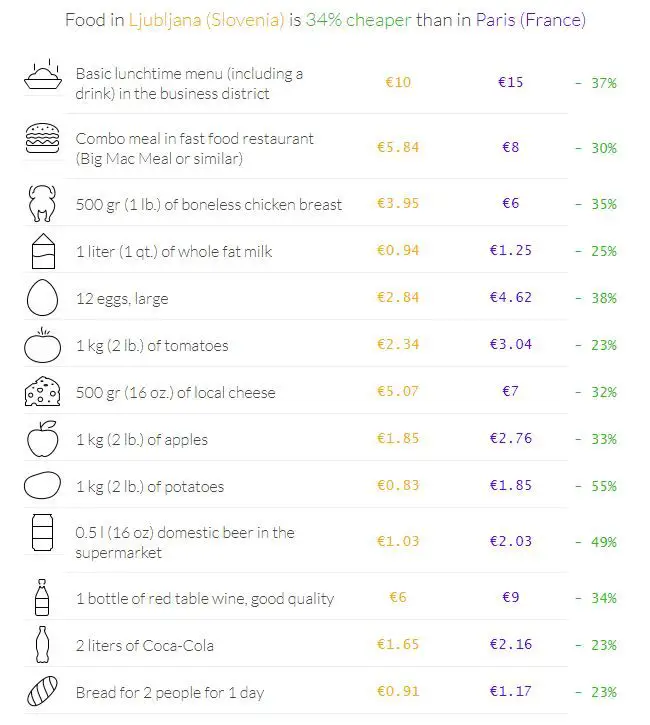Ljubljana related
We got in touch with Juan López to learn more about the English-language science presentations he helps organize in Ljubljana.
Can you tell me a little about the history of Science Bites?
Science Bites started as an idea between a group of scientist friends. We often engaged in conversation to explain how our work was going (as all of us are researchers in different fields), and we were really happy to explain to our close group of friends (non-scientists) what we were doing. One day we thought that it would be great to do the same on a bigger scale, to inform people about the most recent science discoveries and to explain misconceptions around certain topics like nuclear energy or genetic modified organisms. And this would also be a good way to practice science presentations in English, since as researchers it’s one of the main skills we need for conferences.
The first time we made an event we were just nine friends, and then word spread and by the second edition we had 15 new speakers. It brought a golden opportunity for young researchers and students, as they could also practice their social and presentation skills, and since we always met in a relaxing atmosphere and chill crowd, it was the perfect exercise for those who have a bit of fear about speaking in public.
Photo: Tomaž Suhovršnik
Who can come?
Our events are open to the public. We try not to get really technical in our presentations, and to explain with easy terms for everyone to understand. A science background is not needed. Maybe it’s not suitable for really small children since all the presentations are in English, and we assume that the public has certain basic knowledge from high school. The main purpose is to inform, to share science, to bring to the public that “wow” that follows every discovery or understanding of how the world works. We don’t want to teach in our field, we just want to speak about the topics we know the most about.
Photo: Tomaž Suhovršnik
Where’s the new venue, and how will this change the way the events are organized?
The new venue will be Žmauc [Rimska cesta 21, 1000 Ljubljana], near the city center and the Faculty of Philosophy, and currently we are not planning to change our format much. Twenty-minute presentations followed by 10 minutes of questions, three speakers per session, three to five sessions per season (sessions are held every two weeks, the number of sessions depends on how many speakers we have). We would like to give more visibility to the project, reach more researchers, and get even more people to future events.
What should people do if they want to make a presentation?
People just need passion for what they are doing. With passion comes the desire for sharing it with others. Any scientific background is welcome, in the natural or social sciences. We currently have a Facebook page called “Science bites Slovenia” and a message there will put you in contact with us. We accept everyone that wants to participate. They should design a 20-minutes presentation, and while most of our speakers use a PowerPoint presentation with videos, images this isn’t needed. You can decide the best format for your presentation, such as using a whiteboard to write while you’re speaking, or just a straight talk with no technical support. We aim for presentations to be comprehensible, fun and dynamic, so we can interact with the people that come to listen to us, especially during the question part of the evenings.
What can audiences expect?
Audiences can expect a bit more detail explaining the world around us. Science news that sadly can’t be covered in everyday media and news resources, from young scientists working in many different fields. News about the events and related things can be found in the Facebook page “Science Bites Slovenia”. We also have plans to start using a YouTube channel to record our presentations, for those who can’t attend the event and still would like to listen to it.
Anything else you’d like to say?
The event is totally free (apart from what you’d like to consume at the bar) and our the speakers do it for the pure love of science and sharing. After any event you can come and ask whatever questions were not answered in the question time, and we are always happy to speak with people. And who knows, you may find a new field that you didn’t know about, and which motivates you enough to dedicate your work to it!
As noted in the interview, if you'd like to make a presentation, attend one, or just follow the group's activities, then do see the Facebook page called “Science bites Slovenia”. And if you're ready for some relatively simply science presentations in Slovene, then check out the ones held each weekend at the House of Experiments (learn morehere).
STA, 20 November - The 34th Slovenian Book Fair is getting under way at Ljubljana's Cankarjev Dom tonight, featuring more than a hundred publishers and 25,000 books, including 3,000 new titles. Hungary is the guest country.
For several years now the fair has been seeking to expand beyond its national character with a guest country and guest appearances by foreign authors.
The Slovenian Book Fair is an increasingly international event
This year it will welcome Man Booker Prize winner Roddy Doyle, Goncourt Prize winner Marie NDiaye, Fulvio Tomizza Award laureate Mauro Covacich and Nepali poet Yuyutsu Ram Das Sharma.
After France, Italy, Germany, Austria and Switzerland, Hungary will be in the spotlight, showcased through literature, film, music, dance and cuisine.
Zdravko Kafol, the head of the organising committee, says that the fair is not yet international, but that Ljubljana deserves to have an international book fair, especially now that it has been designated as UNESCO's City of Literature.
Talking with the STA ahead of the launch, Kafol said that the fair featured virtually the entire publishing industry in the country and most of the new titles and attracted more visitors than all other book events together.
The publishing sector has not yet broken out of the spiral of contraction. But while it represents only two thousandths of GDP, its symbolic value is much bigger, even though not appreciated, Kafol says.
One-in-four Slovenes functionally illiterate
Despite efforts by various stakeholders, 42% of Slovenians do not read and one out of four is functionally illiterate, while tax on book is one of the highest in the EU, Kafol noted.
This is why the fair has taken it upon itself to promote reading and buying books through various campaigns, such as this year's call to visitors: "Admission free, buy a book more instead!"
Kafol says the aim is to attract more young people, as well as leaders from all walks of life, in order to draw attention to the importance of books for the health of the individual and the country.
Running until Sunday, the fair will open with an address by Prime Minister Marjan Šarec, which Kafol says indicates that the increasing importance that is being attached to books.
More than 300 events to choose from at the Slovenian Book Fair
The fair will see more than 300 accompanying events on seven stages, involving almost 1,000 participants from literary, cultural, social and media life as it strives to become a must-see event.
Among more than 100 authors hosted at the fair, several acclaimed guests from Slovenia will be celebrating their jubilees, including Drago Jančar, Ivo Svetina and Marjanca Jemec Božič.
Next year, the fair will focus on the Enlightenment, to coincide with the 200th anniversary of the deaths of two Slovenian representatives of the movement, Valentin Vodnik (1758-1819) and Žiga Zois (1747-1819). Instead of a guest country, the fair will play host to whole Europe.
The official website, in Slovene, is here
November 14, 2018 - The cost of living in Ljubljana is a tricky subject, made more so to comparing it to the cost of living in another, very different city, to say nothing of the varied lifestyles folk lead, and how this changes as we get older. That said, such figures remain a subject of obvious interest to all those with a more international mindset, as they imagine what life would be like in London, Berlin, Tokyo, New York or Ljubljana. How far their current income and savings would go, and whether a move would require – or enable – significant changes in preferences, tendencies and habitual behaviors.
The cost of living in Ljubljana compared to other European capitals
It’s here the website Expatistan comes in handy, as it uses survey data (details here) to create a ready-reckoner for the relative expense of living abroad, as well as to provide details of the salaries associated with various jobs. While we can’t vouch for the exact precision of the answers, the results do seem to give a pretty good idea of how much it costs to live in Ljubljana compared to some other cities we’ve called home. Below you can see the details for a comparison of the costs of living in the Slovene capital with Paris.
Screenshots from Expatistan
As a further test of the system we entered a list of European capitals and a few other notable cities around the world to obtain the percentage difference in cost of living, with the results shown in the following table:

With hundreds of other cities in the system you can have hours of fun making comparisons and day-dreaming of a new career in a new town, as well as checking the relative salaries and looking for details of international schools, so if curious do look for more data at Expatistan.
Related: Find out the average pay for various jobs in Slovenia
STA, 6 November 2018 - Ivan Radan, a neurologist charged with killing four terminally ill patients with lethal injections, was acquitted as a trial that lasted almost three years concluded at the Ljubljana District Court on Tuesday.
Radan had been charged with manslaughter as well as abuse of medical prescriptions, illegal video recording of dying patients and forgery of sick leave notes, crimes for which he faced 20 years in prison. He was found not guilty on all charges.
The presiding judge, Martin Jančar, issued a stern rebuke of the prosecution as he delivered the verdict as he said the prosecutor had focused on the suspect's personal circumstances.
Facts matter, not personality
"If a person is a liar, addict or has a personality disorder ... this does not mean that he is also a murderer," he said.
And because the prosecution focused on Radan's personality, it overlooked the facts of the matter. "The court must presume innocence, it may not presume guilt," he said.
The judge also said the prosecutor, Katarina Bergant, had been indiscriminate in attempting to discredit one of the key expert opinions, by the Austrian forensic expert Wolfgang Kröll.
Kröll was a key witness in the trial and he was unable to confirm that Radan was responsible for his patients' deaths, and indeed the court invoked Kröll's opinion in declaring Radan not guilty.
The court also highlighted the absence of material evidence and being unable to determine the cause of death of any of the suspected victims since they were not autopsied and were subsequently cremated, rendering exhumation impossible.
The judge stressed that patients who die in hospital must be autopsied unless it is determined that the cause of death is unquestionable.
Since death certificates were signed by Radan and several other doctors, this directly implies that they had determined the cause of death did not warrant further scrutiny.
No evidence of lethal injections
"The collected evidence does not allow the conclusion that [Radan] did in fact inject his patients with potassium, nor are there any other circumstances that would indicate he is guilty," the judge said.
The verdict caps almost three years of court proceedings in a landmark case that has been closely watched by medical experts and the lay public alike due to its severity.
Over 100 witnesses were heard by the court and multiple psychological assessments were carried out to determine whether Radan suffered from a god complex.
The goal was to determine whether Radan did in fact administer deadly cocktails of drugs, including lethal doses of potassium, to several terminally ill patients between 2012 and the end of 2014 as suspected.
He was initially charged with the murder of six patients but two charges were dropped due to a lack of evidence and the remaining four murder charges were reduced to manslaughter.
Radan has maintained his innocence throughout the trial, insisting that he only made it look as if he had administered lethal doses of drugs to terminally ill patients to draw attention to poor communication at the intensive care unit of the Ljubljana UKC Neurology Clinic.
In a statement after the verdict, Radan said "the judge said everything" and refused to provide any further comment.
His attorney Gorazd Fišer, asked if he was pleased with the verdict, said he would be pleased when the people finally recognise that "when in doubt, prosecutors indict and courts acquit," rather than expecting that every case will end with a guilty verdict.
Prosecutor Tamara Gregorčič, standing in for Katarina Bergant, argued the court had minimised witness testimony, which could have a chilling effect on witnesses in future trials.
"I think the judgement is not just and true," she said as she announced that the prosecution would lodge an appeal.
Related: Closing arguments made in bizarre trial of doctor accused of killing patients
STA, 29 October2018 - The battle for the church at the Križanke open-air theatre which was returned to the Teutonic Order in a lengthy denationalisation process in March last year continues, as Festival Ljubljana, which manages the church, has still not handed over the keys. The Teutonic Order has now turned to the court, Dnevnik reports on Monday.
This week’s focal event is Halloween, which occurs on Wednesday, with plenty of horror movies and themed club nights if you want to go out and celebrate that way. It’s also the half-term break, so don’t be alarmed if you see a lot of kids on the streets during school hours – they’re (probably) not doing anything wrong. Finally, Wednesday and Thursday are national holidays, Reformation and Remembrance Day, and some things, including supermarkets, are closed.
STA, 23 October 2018 - A project which tells a story about the past along the river Ljubljanica from its source near Vrhnika to Ljubljana has won the European Heritage Days Grant Award 2018.
The biggest event of the week comes next Sunday, the 28th, with the Ljubljana Marathon. Starting in the morning with the 10k race, this takes over Kongresni trg and Slovenska cesta, and is a colourful and noisy affair that will cause some detours on the road. Music at the starting line is provided by Stroj Machine. There will also be some related events on Saturday.
It’s a story we’ve told before, but it remains, to our mind, a small but pretty good one, an all too human of an easy mistake followed by mild and temporary suffering, the kind of thing most people have done once or twice in their lives – getting off at the wrong stop and spending the night on the streets.
There's a lot of live music going on this week, including what claims to be the first ever K-Pop show in Slovenia, the great Franco Fagioli (see below) returning to Cankerjev dom to sing more of his beloved Handel, and what seems to be even more metal than usual, of the punk, hardcore, black and doom varieties. But whatever you like, we're sure there's something that'll appeal going on over the next 7 days in the capital, so wait for the videos and other media to load then scroll down and see what takes your fancy.


